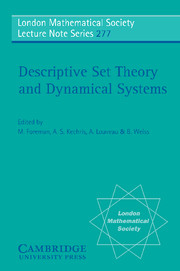Book contents
- Frontmatter
- Contents
- Preface
- 1 An Overview of Infinite Ergodic Theory
- 2 The Multifarious Poincaré Recurrence Theorem
- 3 Groups of Automorphisms of Measure Space and Weak Equivalence of Cocycles
- 4 A Descriptive View of Ergodic Theory
- 5 Structure Theory as a Tool in Topological Dynamics
- 6 Orbit Properties of Pseudo-homeomorphism Groups of a Perfect Polish Space and their Cocycles
- 7 Descriptive Dynamics
- 8 Polish Groupoids
- 9 A Survey of Generic Dynamics
8 - Polish Groupoids
Published online by Cambridge University Press: 05 August 2013
- Frontmatter
- Contents
- Preface
- 1 An Overview of Infinite Ergodic Theory
- 2 The Multifarious Poincaré Recurrence Theorem
- 3 Groups of Automorphisms of Measure Space and Weak Equivalence of Cocycles
- 4 A Descriptive View of Ergodic Theory
- 5 Structure Theory as a Tool in Topological Dynamics
- 6 Orbit Properties of Pseudo-homeomorphism Groups of a Perfect Polish Space and their Cocycles
- 7 Descriptive Dynamics
- 8 Polish Groupoids
- 9 A Survey of Generic Dynamics
Summary
Introduction
This chapter has two themes. The primary one is closely related to the topic of the workshop, being the idea of groupoids as generalizing transformation groups and as a tool for thinking about transformation groups. Questions about orbit spaces or ergodicity, for example, are natural for groupoids. The secondary theme is minor from the viewpoint of the workshop, but it seems worthwhile to mention some other situations where groupoids can be used.
The first section gives some basic information about Polish spaces. The second one provides a definition of groupoid and a few examples. Then we continue with a third section about groupoids related to foliations of manifolds and a fourth section about groupoids in which the unit space has a cover by open invariant sets on which the groupoid structure is given by a transformation group. For the final section we concentrate on dichotomies.
Polish Spaces
Although many readers may know good sources for information on Polish spaces, it won't hurt to mention books by Bourbaki [Bou], Kechris [Ke], Kuratowski [Ku], and Srivistava [Sr], for those not familiar with them.
Many spaces that arise naturally in mathematics are Polish, and this is certainly true for groupoids in the analytic setting. Besides analysis itself, we include in this class anything involving spaces of functions, most problems having a physical motivation, and most questions deriving primarily from geometry.
- Type
- Chapter
- Information
- Descriptive Set Theory and Dynamical Systems , pp. 259 - 272Publisher: Cambridge University PressPrint publication year: 2000
- 1
- Cited by

